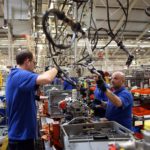
30 per cent of UK jobs could potentially be automated away by the early 2030s Work isn’t working anymore. Labour productivity has fallen in the UK since the financial crisis ; 13.5 million people are living in low-income households; real wages are falling and the Gini coefficient, which measures inequality, is rising.
The sustainability and quality of jobs in our economy is also decreasing – 7.1 million workers now face precarious working conditions , meaning that uncertainty (and for many, anxiety) itself is now built into our employment system. According to some estimates , 30 per cent of UK jobs […]
Full Post at www.independent.co.uk








